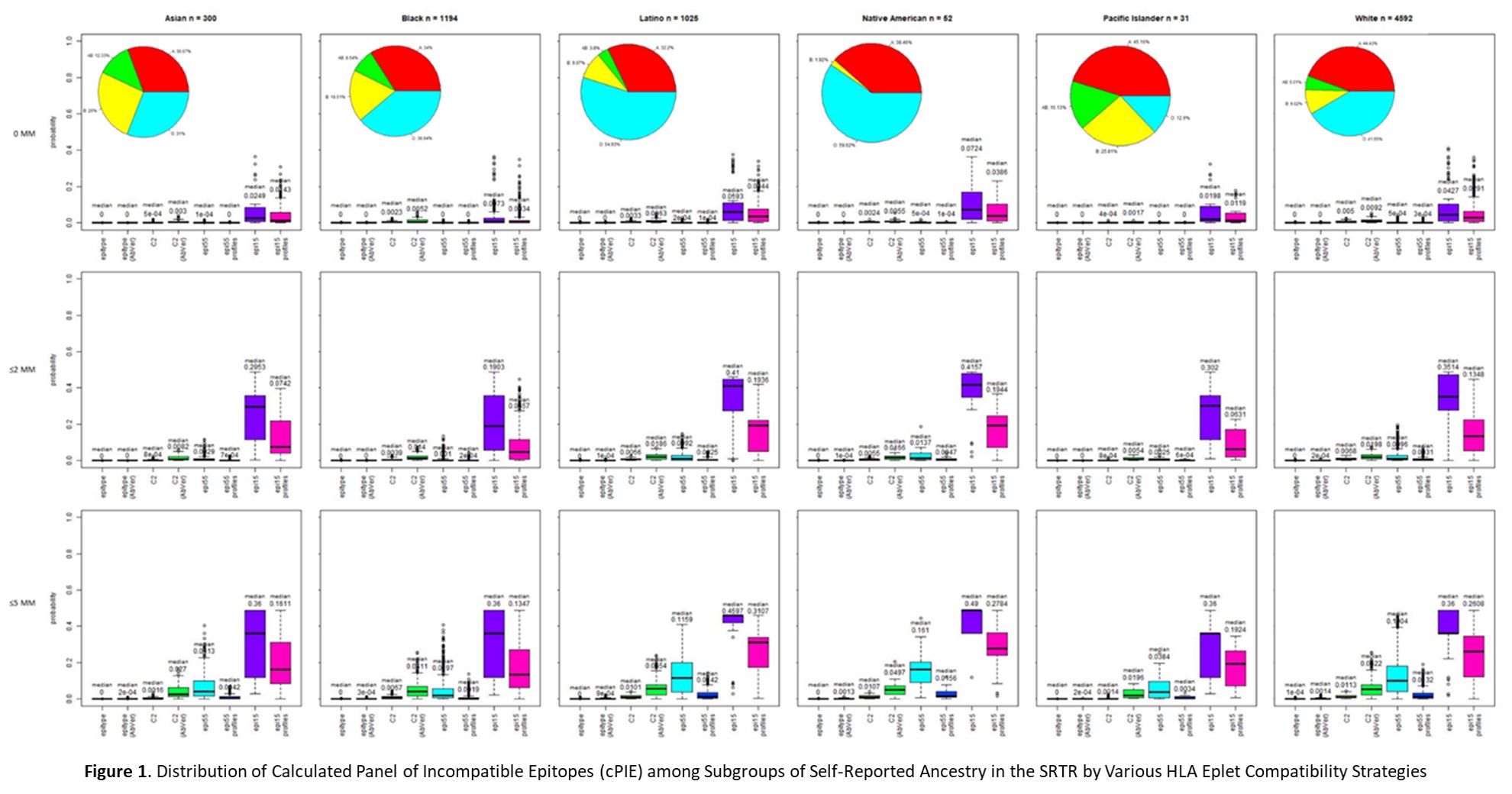Is Equitable Access to Transplantation Possible in the Era of HLA Epitope Compatibility?
1Medicine, McGill University, Montreal, QC, Canada, 2McGill University, Montreal, QC, Canada, 3Leiden University Medical Centre, Albinusdreef, Netherlands, 4University of British Columbia, Vancouver, BC, Canada, 5Medicine, McGill University Health Centre, Montreal, QC, Canada
Meeting: 2021 American Transplant Congress
Abstract number: LB 74
Keywords: Allocation, Donation, Epitopes, Histocompatibility
Topic: Clinical Science » Kidney » Kidney Deceased Donor Allocation
Session Information
Session Name: Kidney Deceased Donor Allocation
Session Type: Poster Abstract
Session Date & Time: None. Available on demand.
Location: Virtual
*Purpose: We applied the calculated Panel of Incompatible Epitopes (cPIE), an algorithm informing on the likelihood of identifying blood group and eplet-compatible donors, to study how self-reported ancestry affects access to transplantation.
*Methods: Candidates were identified from an incident cohort of 6169 0% PRA patients in the Scientific Registry of Transplant Recipients first activated on the kidney waiting list Jan 1, 2011 to Dec 31, 2011. Patients listed at multiple centres were excluded. For cPIE estimation, the donor pool was composed of 4608 consecutive deceased donors who presented Jan 1, 2010 to Dec 31, 2010. Imputed allele-level genotypes for HLA A, B, C, DRB1, and DQB1 were transformed to epitypes. The likelihood of finding blood group matched and eplet compatible donors by candidates’ self-reported ancestry was estimated for various eplet compatibility thresholds (by HLA class, antibody-verified (AbVer), and subsets of 55 and 15 eplet mismatches (EMM) increasingly important for predicting death censored graft failure). For each threshold, donors were deemed compatible, if all their eplets were included in the candidates’ epitypes (0 EMM). Distribution of cPIE when accepting residual ≤2 and ≤5 EMM were also assessed.
*Results: Likelihood of identifying compatible donors (Median and Interquartile Range (IQR)) for Asian (N=300), Black (N=1194), Native American (N=52), Pacific Islander (N=31), White (N=4592) and Latino (N=1025 some overlap with prior groups) candidates was greater for subsets of higher risk eplets vs. class II AbVer, all AbVer, and complete epitypes (Figure 1). There was heterogeneity in the likelihood of identifying compatible donors at the individual level within each self-reported ancestry group, with Black candidates less likely to match. For each eplet compatibility strategy, matching was more likely for candidates accepting donors with residual ≤2 and ≤5 EMM. We found similar patterns in candidates activated in 2012 considering the 2011 donor pool.
*Conclusions: Verification of allele-level HLA genotype is required for candidates of any ancestry to inform on access to eplet compatible transplants. For harder to match candidates, preferences must be established on the trade-off between immune risk and gaining access to transplantation when considering donors with residual EMM .
To cite this abstract in AMA style:
Parto S, Lamsatfi J, Liu B, Bourdiec A, Foster B, Oualkacha K, Claas F, Keown P, Sapir-Pichhadze R. Is Equitable Access to Transplantation Possible in the Era of HLA Epitope Compatibility? [abstract]. Am J Transplant. 2021; 21 (suppl 3). https://atcmeetingabstracts.com/abstract/is-equitable-access-to-transplantation-possible-in-the-era-of-hla-epitope-compatibility/. Accessed February 14, 2026.« Back to 2021 American Transplant Congress

